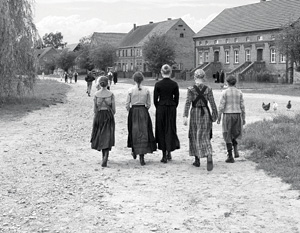

EVEN THE TITLES for The White Ribbon inform us of director Michael Haneke’s rigor: tiny type, white on black, lingers onscreen to try to get us used to the slower tempo of life a century ago. The camera sits still and watches, as if it will get punished if it squirms. Here is stark black-and-white clarity. Here is the kind of bleak Germanic humor that makes English comedy seem fulsome and obvious.
The White Ribbon is the kind of movie where a child tied to his bed is advised to “sleep tight.” Amid the 10-ton pressure of life in a traditional farming town, we witness acts of open rebellion: small acts, as if they were the brake lights flashing on a car going over a cliff.
In the insignificant village of Eichwald (“Oakwood”), just before World War I, we hear a series of stories. These stories concern acts of violence that disturbed the orderly progression of the years. The events are narrated by an old man who was, long ago, the town’s vacant-looking schoolteacher (Christian Friedel).
He advises us that everything we will see is based on things half-heard and half-remembered. We can take this ineffectual man’s word for it. Clues pass him by, and he can’t provide a solid resolution for the story. He doesn’t seem to understand that Eichwald is poisoned, root and branch.
The teacher is one of three members of a social class located between the town’s baron (Ulrich Tukur) and the farm people, who are treated like two-legged cattle. The rest of Eichwald’s intelligentsia consists of two men. One is a self-confident, beefy pastor (Burghart Klaussner) with two splayed white ribbons of purity at his throat. The pastor’s tranquil savagery to his family makes him as spine-chilling a preacher as ever seen in a movie.
The other man is the village doctor (Rainer Bock), a sardonic but correct widower. The doctor’s horseback-riding injury—caused by some anonymous party’s tripwire—begins the film’s legend of punishment and reprisals. Not long after the doctor is injured, a farm laborer’s wife is killed working in the baron’s defective mill. Anonymous retaliation is swift: first, the baron’s crop is attacked, and then the nobleman’s young son is kidnapped, stripped and beaten; later, a barn burner strikes.
Between these sensations, we watch the education of the pastor’s young son, Martin (the touching Leonard Proxauf), who is first subjected to ritual corporal punishment then accused of sinful, deadly masturbation.
We also see the unwinding of an affair between the doctor and the town’s midwife (Susanne Lothar). In The White Ribbon, where all the real violence takes place behind closed doors and between the scenes, it is the emotional cruelty that affects us most.
The schoolteacher comments that what we see will help us understand “the events that came after.” By “the events,” Haneke may mean Germany’s next 30 years. Eichwald is a serpent’s-egg hatchery: the village’s obedient children will be participants in the kaiser’s war and Hitler’s crime wave.
So it’s the Holocaust again? Maybe, but there’s more going on in Haneke’s scheme. As the cities grow, a longing for the rural life grows with them. Some people blow their paychecks at Whole Foods because it’s the next best thing to being able to pet a lamb. The White Ribbon is a striking reminder of what got our great-grandparents off the land. Eichwald is a previously unseen combination of squalor and regimentation. Even the garden cabbages are so tightly set in their rows that it sets your teeth on edge to look at them. Here is the kind of Old World that made people risk everything they had for a new one.
Yet the film gives us more than relentless grimness. It isn’t meant to bathe us in the stinking mud, like Béla Tarr’s Satantango. There is hopefulness in the courtship of the schoolteacher and Eva the governess (the appealingly nerdette Leonie Benesch). Eva’s father is strict, but he startles us with gruff kindness.
We see some evolution in Eva after she gets away to the big city, something that almost makes her look exuberant. During a horse-drawn drive in the country with the yearning schoolteacher, Eva requests not to be taken for a picnic by the lake. This is as much of a refusal to a man’s pass as a working-class girl gets to make in this film. In Eichwald, as in the old Scottish joke, foreplay consists of the phrase “Brace yourself.”
The White Ribbon is perplexing. Haneke (Funny Games, Hidden) taunts us with withheld information. The film is most specifically about the German lands. Looming over Eichwald, and studied from various angles, is a squat brick tower that looks like it ought to have armed guards on top. The casual viewer would call it picturesque. The heavy dusty drapes, the lines of deer skulls on the walls, the trinkets and carved lintels are all part of the kind of Germany that old German restaurants tried to re-create.
Yet Haneke’s film applies to any place where the pig stalls are raked and the wheat is harvested—to any place where downtrodden, blinkered rurals have only one escape from their lives: the army. In this, Eichwald could have sister cities in Afghanistan or Nebraska. The movie warns us of what happens when spirits are crushed today, and it mourns for all those who suffered in the past.
Local theaters, show times and tickets at MovieTimes.com.
THE WHITE RIBBON (R; 144 min.), directed and written by Michael Haneke and starring Christian Friedel, opens Jan. 22 at Camera 7 in Campbell and the Aquarius in Palo Alto.



